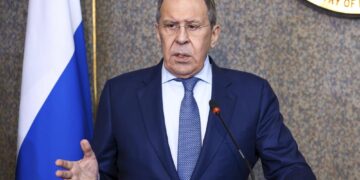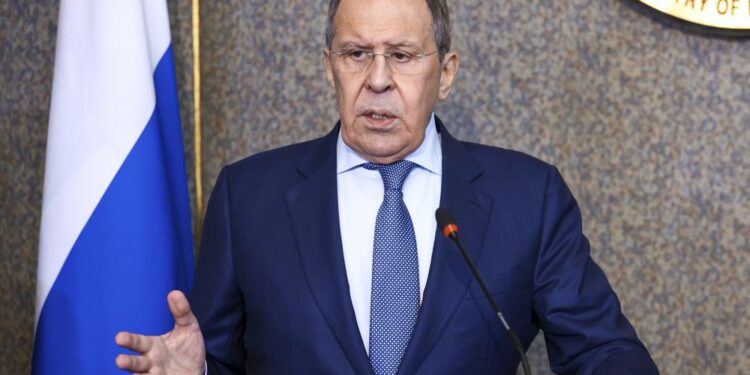By Enyichukwu Enemanna
Foreign Minister Sergey Lavrov has said Moscow’s ultimate target in Ukraine is to topple President Volodymyr Zelenskyy’s g6overnment, even as its forces pummel the country with artillery barrages and airstrikes.
Lavrov’s comment comes amid Ukraine’s efforts to resume grain exports from its Black Sea ports, a move that would help ease global food shortages, under a new deal tested by a Russian strike on Odesa over the weekend.
Speaking to envoys at an Arab League Summit in Cairo late Sunday, Lavrov said Moscow is determined to help Ukrainians “liberate themselves from the burden of this absolutely unacceptable regime.”
Lavrov accused Kyiv and its Western allies of spouting propaganda intended to ensure that Ukraine “becomes the eternal enemy of Russia.”
“Russian and Ukrainian people would continue to live together. We will certainly help Ukrainian people to get rid of the regime, which is absolutely anti-people and anti-historical,” he said.
Lavrov’s remarks contrasted with the Kremlin’s line early in the war, when it repeatedly emphasized that Russia wasn’t seeking to overthrow Zelenskyy’s Government, even as Moscow’s troops closed in on Kyiv.
Russia later retreated from around the capital and turned its attention to capturing Ukraine’s industrial Donbas region in the east. The fighting is now in its sixth month.
Lavrov argued that Russia was ready to negotiate a deal to end hostilities in March when Kyiv changed tack and declared its intention to rout Russia on the battlefield. He said the West has encouraged Ukraine to keep fighting.
“The West insists that Ukraine must not start negotiations until Russia is defeated on the battlefield,” Lavrov said.
It was not yet clear when grain shipments would resume following Russia and Ukraine’s signing of agreements with the United Nations and Turkey on Friday.
The deals are aimed at clearing the way for the shipment of millions of tons of desperately needed Ukrainian grain, as well as the export of Russian grain and fertilizer.
While Russia faced accusations that the weekend attack on the port of Odesa amounted to reneging on the deal, Moscow insisted the strike would not affect grain shipments.
During a visit to Congo on Monday, Lavrov repeated the Russian military claim that the strike targeted a Ukrainian navy boat and a depot with Harpoon anti-ship missiles supplied by the West. He said the attack took part in the military section of the port at “a significant distance” from the grain terminal.
“We haven’t created any obstacles to grain deliveries in accordance with the agreements signed in Istanbul,” Lavrov said. He said the agreements “contain nothing that would prevent us from continuing the special military operation and destroying military infrastructure and other military targets.”
The foreign minister also planned to visit Uganda and Ethiopia in what was seen as an effort to bolster African support for Russia, especially for any upcoming U.N. votes.
In Moscow, Kremlin spokesman Dmitry Peskov said that Moscow has no interest in halting all gas supplies to Europe and that recent restrictions on the flow “are simply the consequences of restrictions the Europeans have imposed, and the Europeans themselves are suffering from these restrictions.”
“Russia is a responsible gas supplier, and no matter what anyone says, the European Commission, in European capitals, in the U.S., Russia has been and continues to be a country that to a large extent guarantees Europe’s energy security,” Peskov said.




































